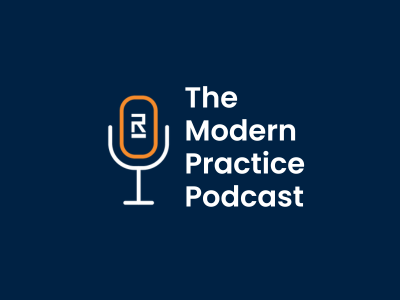On this episode of The Modern Practice Podcast, host Gary Tiratsuyan is joined by Amaris Conerty, Practice Solutions Consultant at Rectangle Health to discuss how practices can meet the needs of today’s patients.
During the discussion, Amaris shares how providers can develop a patient-centric strategy that will help tackle the challenges of today, and future-proof processes for sustained growth.
As the conversation continues, Amaris also outlines the need for a single, consolidated solution to manage the day to day from payments, to appointment scheduling and reminders, to compliance.
Connect with Amaris on LinkedIn.
Learn more about Rectangle Health’s best-in-class software, Practice Management Bridge®.
Transcript
Gary Tiratsuyan 00:21
Hello, everybody and welcome back to the Modern Practice Podcast. Over the past eight months, we’ve had an incredible group of guests from within and outside the Rectangle Health organization, and today is no different. I’m excited to introduce you all and welcome Amaris Conerty, Practice Solutions Consultant at Rectangle Health, to the show to discuss how patient experience expectations during pre- and post-care have evolved and how providers can meet them. Amaris, thank you so much for taking the time. Happy to have you on the show.
Amaris Conerty 00:54
Thanks so much, Gary. So happy to be here with you.
Changes in Practice Management
Gary Tiratsuyan 00:57
Of course, my pleasure. So, let’s get into it. You’ve been with Rectangle Health for three-plus years now and came on board at a challenging time, to say the least, at the height of COVID. Could you sort of take me through the biggest differences you see in the way practices manage their day-to-day on day one of your time here versus now? What would you say is changed?
Amaris Conerty 01:19
Yeah, I have seen a huge shift in practices becoming more digital, more contactless, and having more flexible options available from them to their patients, to engage with them, to be able to collect payments from them, and just overall provide a safe environment, a contactless environment. So, I’ve really seen a shift in the mindset to become more technologically advanced at the practice.
A Need for Digital Payment Solutions
Gary Tiratsuyan 01:51
I’m looking at a stat right now that says that nearly 80% of consumers prefer to pay medical bills digitally. And I know many practices still use paper statements, spend time following up and eventually capture those balances due. But operationally, the longer a balance stays in accounts receivable, the more it costs the practice to get paid, in time in money. What would you say to a practice with a more traditional approach?
Amaris Conerty 02:22
You hit the nail right on the head, Gary, as you usually do. Even speaking from personal experience, when a provider will send me a physical bill, between chasing after my 15-month-old and managing day to day meetings and just life in general, trying to get to that and making a payment over the phone and trying to catch the office when they’re so busy throughout the day as well managing and juggling all the things on their plate… It really is critical at this point to have a digital way of collecting payments, whether that’s compliant card on file with the preauthorization that Rectangle Health obviously offers to our clients to be able to do, being able to send a text message. We know that 98% of text messages are opened in the first two minutes of receiving them. And it’s a huge game changer for practices to collect payments and reduce the time and money spent on billing by sending paper statements or even making phone calls to collect over the phone that way.
And then also just being able to have a payment button on your website that if you’re closed, your bank account is still open to receive payments from your patients by being able to go online, even if it’s leaving a voicemail letting them know, Hey, this is about your bill, go ahead and pay it online and letting having patients have that opportunity to do that. So it’s a huge game changer. And that’s definitely something that I would share with those traditional, more traditional practices in how they can change things up and make the payments rain.
Communicating Scheduling Reminders
Gary Tiratsuyan 03:53
That’s a perfect segue because I wanted to shift gears, moving off payments to scheduling reminders. And that’s all a part of communication between practice and patients in general. You mentioned that within the two first two minutes of receiving a text that the text is opened. So how can a staff do communication scheduling reminders better and more effectively, especially nowadays with staffing shortages, employee burnout and high employee turnover too.
Amaris Conerty 04:27
Yeah, absolutely. Again, turning back to what I’ve seen since the height of COVID. And since working with Rectangle, just the shift in this mentality to become more digital and to have more advances. So, I’m so excited that Rectangle has not only developed and enhanced this award-winning payment solution to help practices, but we’ve invested in other resources to help continue to simplify the business side of healthcare and automate those processes for practices—especially for the ones that are short-staffed, especially for the ones that have a million and one other things to worry about throughout their day. So, making sure that you have automated appointment reminders, auto-filling of a schedule, being able to have mass messages go out to your patients, that you have an announcement that there’s a closure or schedule change or having a waitlist and having that management to be able to prioritize your patients so that they can be on that list. If there’s a last-minute cancellation, having that process automated through our solutions that we’ve invested in, like RavePoint, ReminderCall, again, making that more digital, having that integration with their current practice management software is again, a huge game changer. You’ll hear me say that a lot, because it really is exciting to see how it’s helped and benefited the practices that I’ve had an opportunity to work with.
Key Considerations for Practice Management Software
Gary Tiratsuyan 05:50
Game changing is something that’s very often heard here at Rectangle Health. The enhancements certainly speak for themselves. So, let’s get into the execution portion. And you mentioned automation. We’re talking about taking manual tasks and automating—simplifying the complex to save time, energy and money. If you are an office manager or a practice owner, or vetting out software to help with payments, communication, compliance… what are the must haves and key considerations on your checklist?
Amaris Conerty 06:26
One of the key considerations for me is definitely consolidation. How can I simplify the bills I pay, the people I’m working with, the support I have, and the integrations that are possible, to one vendor? And again, as we’ve evolved since 2020, I’m so excited that Rectangle Health can be that holistic ecosystem where not only do we have again, that award-winning payment solution, an integrated payment solution, but we now also have the integrated engagement, patient communication tools and appointment reminders, waitlist management, in addition to helping simplify and manage and maintain compliance needs when it comes to HIPAA and OSHA too. So, consolidation is key for me, and it has been for a lot of the clients and practices I’ve had an opportunity to work with.
Gary Tiratsuyan 07:20
That’s another big buzzword in the industry, in healthcare and outside of healthcare as well, is consolidation. And I love what you said about evolving with patients and meeting their needs, but also evolving with the provider and meeting their needs. Can you sort of give me some of the a-ha moments or the wow moments, you’ve heard from practices who onboard this award-winning solution? In reality, it’s a digital set of helping hands.
Amaris Conerty 07:53
Yeah, the biggest a-ha moments I’ve had are just the amount of time that’s put back into my office manager’s day, the weight that’s lifted off of their shoulders, especially dealing with short-staffed issues, one of the biggest obstacles that practices are facing is just the people that don’t want to work. Or if they’re there, training them on things. So having something that’s user friendly in place, that’s really easy to navigate and being able to manage the different tools to provide flexible options to their patients, whether that’s collecting payment, or it’s engaging with them, automating that appointment reminder, appointment confirmation, waitlist management, and calendar scheduling management piece of the puzzle. And even when it comes to HIPAA and OSHA, management and maintenance at the practice, being able to automate that and have that, again, burden lifted off of their shoulders to continue to put more time back into their day, that’s got to be one of the biggest a-ha moments. And the consolidation and the automation in everything that we provide to practices… just how excited my office managers are to have more time put into their day to focus their attention on other tasks, because we truly simplify the business side of healthcare for them.
Gary Tiratsuyan 09:11
So, for a practice, or an office manager and owner, whoever is listening in today, how can they get in touch with you?
Amaris Conerty 09:18
Yeah, they can certainly email me or give me a call. They can catch me on social media, LinkedIn. I’m always happy to engage, however, is most convenient. There’s so many ways available to us. So being able to leverage any and all of them is key.
Gary Tiratsuyan 09:36
Absolutely. I’ll drop your profile links in the episode description below. And I have to say thank you so much, again, for taking the time to do this. I know how busy you are. And I appreciate you being here. And hope we can chat again real soon.
Amaris Conerty 09:51
Awesome. Thanks so much, Gary.
Gary Tiratsuyan 09:53
For our audience tuning in before we wrap up. Don’t forget to like, subscribe and leave your feedback on this episode and what you’d like to hear discussed on future episodes of the Modern Practice Podcast, we’d love to hear from you. Thanks for tuning in till next time, everybody.
Editor’s note: This interview has been edited for length and clarity.



